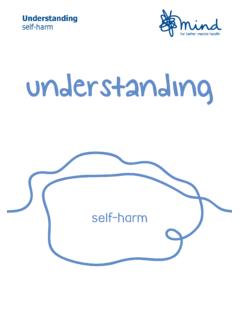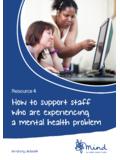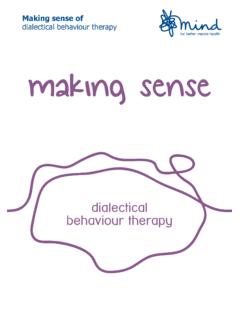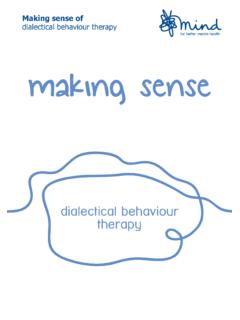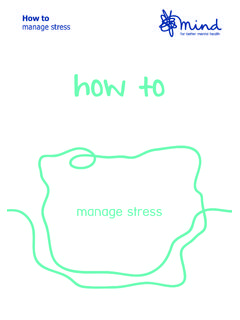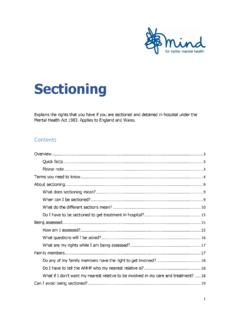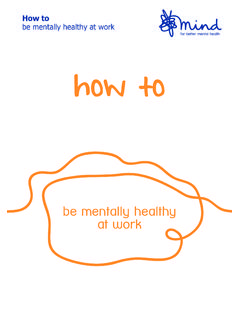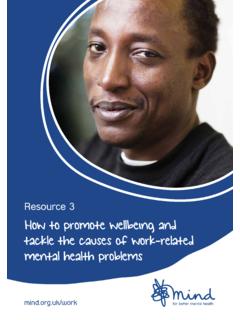Transcription of Understanding borderline personality disorder …
1 1 Understandingborderline personality disorderunderstandingborderline personality disorder Understanding borderline personality disorderThis booklet is for anyone experiencing borderline personality disorder (BPD). It explains what the diagnosis means and what it s like to live with BPD. It also provides information about self-care, treatment and recovery, and gives guidance on how friends and family can is borderline personality disorder (BPD)? 4 What causes BPD? 7 What's it like to live with BPD? 9 How can I help myself cope? 12 What treatments can help? 15 Could my diagnosis be wrong?
2 18 How can friends and family help? 21 Useful contacts 234 Understanding borderline personality disorderWhat is borderline personality disorder (BPD)? borderline personality disorder (BPD) is a type of personality disorder . personality disorders are a type of mental health problem where your attitudes, beliefs and behaviours cause you longstanding problems in your are the symptoms of BPD?You might be given a diagnosis of BPD if you experience at least five of the following things, and they've lasted for a long time or have a big impact on your daily life: You feel very worried about people abandoning you, and would do anything to stop that happening.
3 You have very intense emotions that last from a few hours to a few days and can change quickly (for example, from feeling very happy and confident in the morning to feeling low and sad in the afternoon). You don't have a strong sense of who you are, and it can change depending on who you're with. You find it very hard to make and keep stable relationships. You act impulsively and do things that could harm you (such as binge eating, using drugs or driving dangerously). You have suicidal thoughts or self-harming behaviour. You feel empty and lonely a lot of the time.
4 You get very angry, and struggle to control your When very stressed, sometimes you might: feel paranoid have psychotic experiences, such as seeing or hearing things other people don't feel numb or 'checked out' and not remember things properly after they've you only need to experience five of these possible symptoms to be given the diagnosis, BPD can be a very broad diagnosis and include lots of different people with very different experiences.[For me] having BPD is like the emotional version of being a burn victim. Everything in the world hurts more than it seems to for everyone else and any 'thick skin' you are supposed to have just isn't does ' borderline ' mean?
5 The term ' borderline personality disorder ' came about because in the past, doctors used to think that you could be on the borderline between psychosis and 'neurotic mental health problems' (an old-fashioned way of describing all other mental health problems). Mental health professionals don't usually talk about mental health like this anymore, so if you get a diagnosis of BPD it can be hard to understand what it of this, some people prefer to use the term emotionally unstable personality disorder (EUPD), as they feel it's a clearer description of the experiences you might have with this diagnosis.
6 The terms BPD and EUPD both refer to the same mental health problem it's your choice which term you want to use, but your doctor might use is borderline personality disorder (BPD)?6 Understanding borderline personality disorderDoes BPD mean I have a bad personality ?If you're given a diagnosis of BPD, it's understandable to feel like you're being told that who you are is 'wrong'. But BPD does not mean that you have a bad all have both positive and negative personality traits, and we all have feelings and behaviours that can be useful at times and a problem at others. For example, if you can only concentrate on a task under pressure, you might be good at exams but bad at long projects.
7 But if you experience BPD, some of your feelings or behaviours might be so difficult for you to manage that they're stopping you from living your life as you'd like to. Treatment for BPD can help you work out which thought and behaviour patterns are useful to you, and which aren' I was diagnosed I felt like I was being told my personality was broken. It's through my friends and family's love and support that [I've come to see] my personality is still mine and not broken as I'd can diagnose me with BPD?You can only be diagnosed with BPD by a mental health professional, such as a psychiatrist not by your GP.
8 If you speak to your GP about your mental health and they think you might have BPD, they can refer you to your local community mental health team (CMHT), who will be able to assess you. After overcoming the initial shock of the diagnosis, it is actually a blessing because now I know what I need to do to get causes BPD?There's no clear reason why some people develop BPD. More women are diagnosed with BPD than men, but it can affect people of all genders and backgrounds. However, most researchers think that BPD is caused by a combination of factors, such as difficult childhood and teenage experiences, genetic factors and your personality in , if you already experience some BPD symptoms, then going through a stressful time as an adult could make your symptoms worse.
9 How could childhood experiences cause BPD?It's not clear what causes BPD, but if you get this diagnosis you're more likely than most people to have had very difficult or traumatic experiences growing up, such as: chronic fear or distress family instability, such as living with a parent who is an alcoholic, or who struggles to manage a mental health problem sexual or physical abuse neglect losing a you had difficult childhood experiences like these, you might have developed certain beliefs about how people think and how relationships work, and developed certain strategies for coping, which aren't helpful in your adult life.
10 You might also still be struggling with feelings of anger, fear or I get let down, it just reinforces my belief that the world is full of bad people who won't be kind to you like my parents weren't kind to causes BPD?8 Understanding borderline personality disorderCan children and young people get BPD?It's very hard to diagnose BPD in children and young people because your personality is still developing as you grow up. However, a psychiatrist could diagnose you with BPD while you are still a teenager if they are confident that your symptoms have gone on for long enough that there can't be another BPD be genetic?


